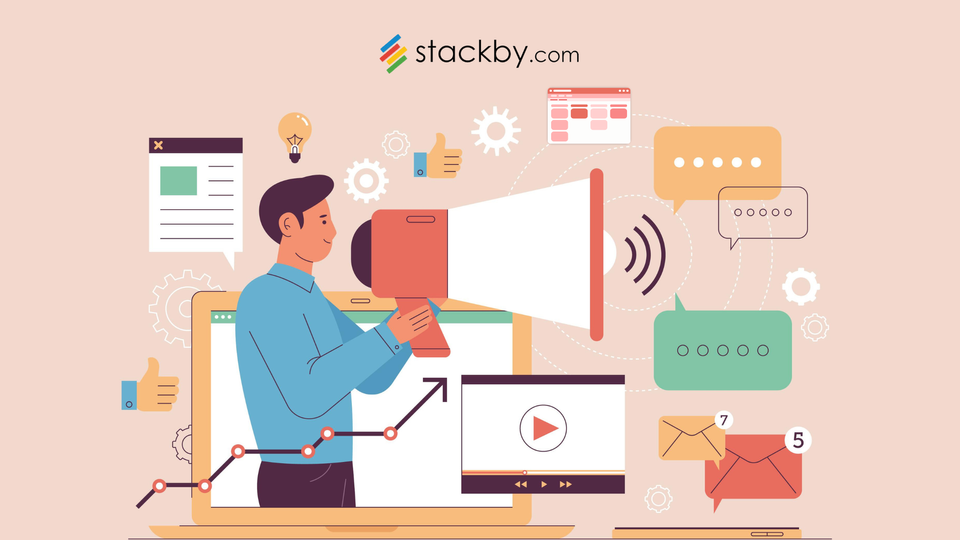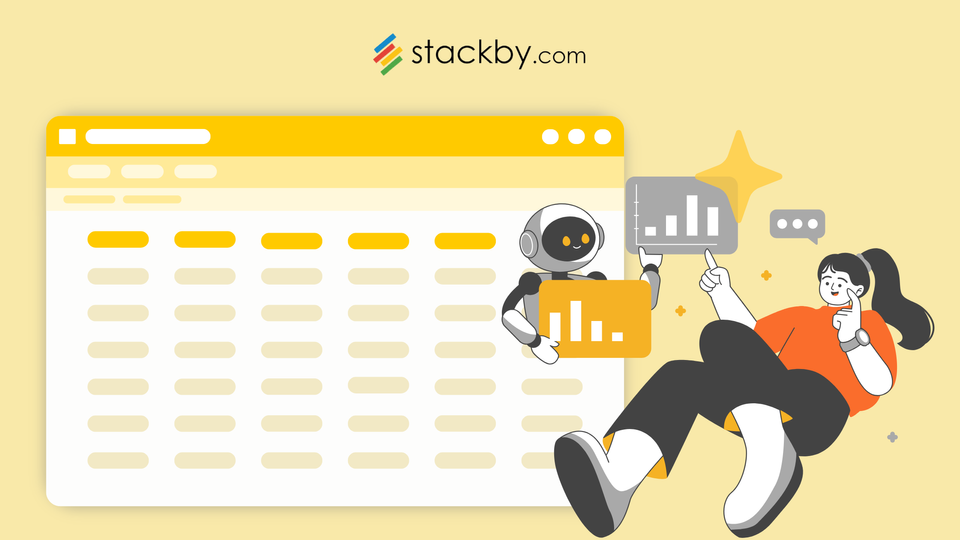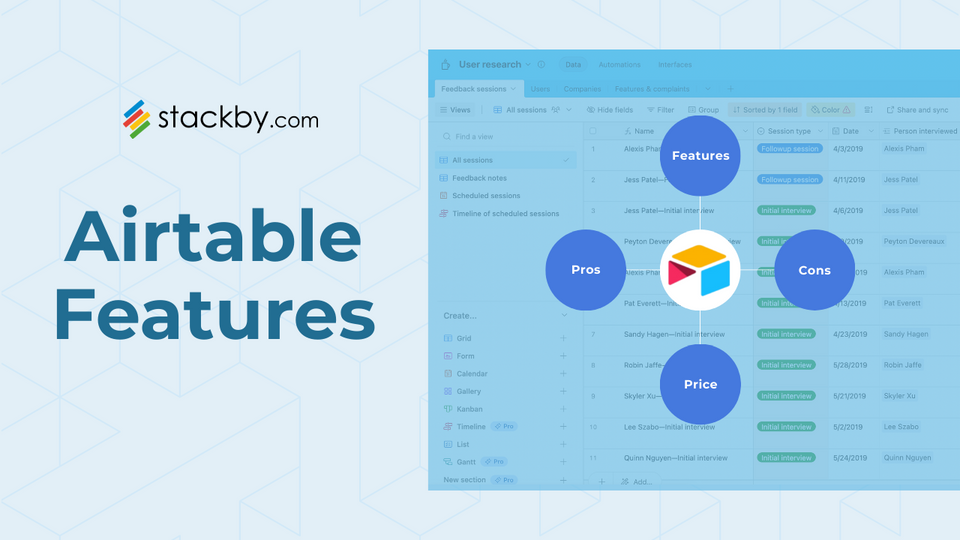Top 12 Database Software for Small Business in 2026 (Free +Paid)
Small businesses need simple, scalable database software to manage data efficiently. This guide covers the top 12 free and paid database tools for small businesses in 2026.
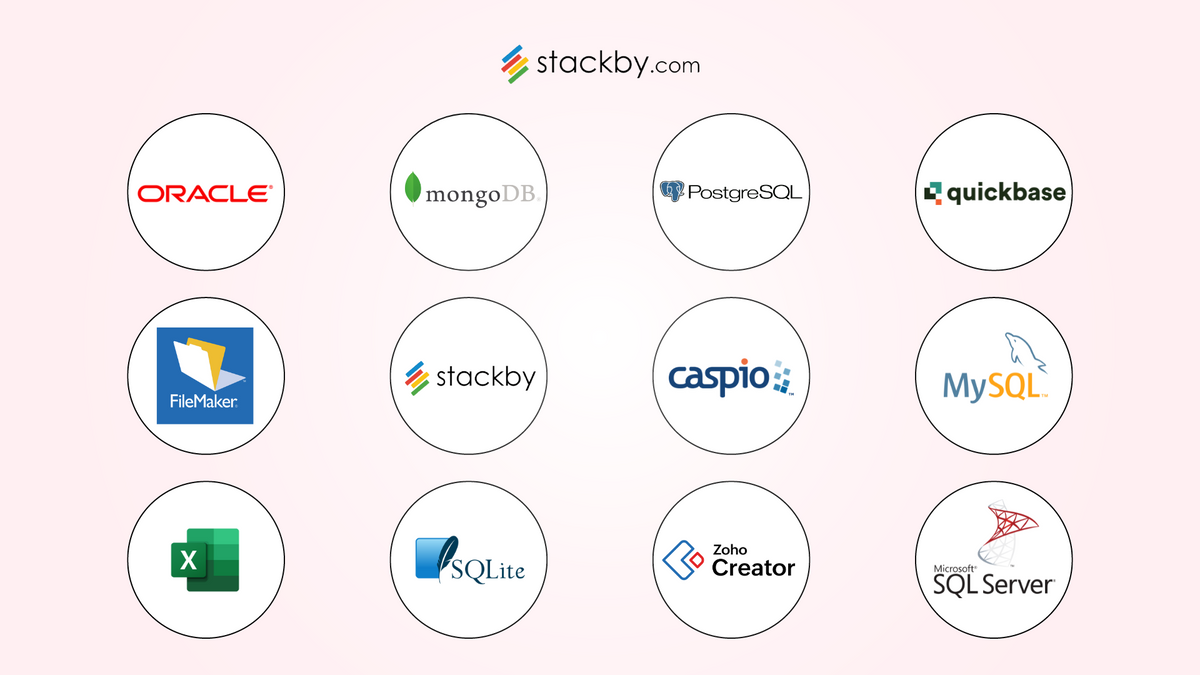
Let's assume that You're sitting on a goldmine of business data, but instead of nuggets of insights, all you see is a jumbled mess of numbers and names. Sound familiar? If you're nodding your head (or simply suppressing a groan), you're not alone. For many small to medium-sized businesses (SMBs), data management feels like trying to drink from a fire hose – overwhelming and potentially messy.
But here's the kicker: with the right database software, that flood of information can transform into a steady stream of actionable insights. Whether you're a tech-savvy startup or a traditional business dipping your toes into digital waters, choosing the best database software for your small business can be a game-changer.
In this guide, we're diving deep into the world of SMB-friendly database solutions. From affordable database management systems to scalable cloud options, we've got the scoop on 12 top-notch tools that can turn your data dilemmas into data-driven success stories.
Why Database Software is the Secret Sauce for Small Business Success
Let's face it: in the digital age, data is the new gold. But unlike the shiny metal, the true value of data lies not in hoarding it, but in how you use it. That's where database software comes in – it's the modern-day pickaxe for your data goldmine. Here's why it's a must-have tool in your SMB arsenal:
1. Organized Data Management
Imagine trying to find a specific document in a room full of randomly stacked papers. That's what managing business data can feel like without a proper database system. Database software provides a structured way to store, organize, and retrieve your business information.
- Centralized Information: Keep all your data in one place, from customer details to inventory records.
- Easy Retrieval: Find the information you need in seconds, not hours.
- Data Integrity: Reduce errors and inconsistencies in your data.
Example: A small e-commerce business using database software can easily track product inventory, customer orders, and shipping information in one system, ensuring accurate and up-to-date records.
2. Improved Efficiency
Time is money, especially for SMBs. Database software can significantly improve operational efficiency by automating many data-related tasks.
- Automated Data Entry: Reduce manual data input and the associated errors.
- Streamlined Processes: Automate repetitive tasks like report generation or invoice creation.
- Improved Collaboration: Enable multiple team members to access and update information simultaneously.
Statistic: According to a study by Nucleus Research, automation of data processes can lead to a productivity gain of up to 20% for SMBs. For businesses managing significant online operations, tackling challenges like Akamai bypass can streamline data collection efforts and improve workflow efficiency.
3. Better Decision Making
In the fast-paced business world, making informed decisions quickly can give SMBs a competitive edge. Database software provides the foundation for data-driven decision making.
- Real-time Insights: Access up-to-date information to make timely decisions.
- Comprehensive Reporting: Generate detailed reports to analyze business performance.
- Data Visualization: Use graphs and charts to spot trends and patterns easily.
Example: A small marketing agency using database software can quickly analyze the performance of different campaigns, allowing them to allocate resources more effectively and improve ROI for their clients.
4. Enhanced Customer Service
In an era where customer experience can make or break a business, having quick access to customer information is crucial.
- 360-degree Customer View: Have all customer interactions and history in one place.
- Personalized Service: Quickly access customer preferences and past interactions to provide tailored service.
- Proactive Support: Identify and address potential issues before they escalate.
Statistic: A study by American Express found that 86% of customers are willing to pay more for a better experience. Effective use of customer data through database software can significantly enhance this experience.
5. Scalability
As your business grows, so does your data. The right database software grows with you, eliminating the need for costly and disruptive system overhauls. Additionally, as businesses expand globally, managing financial operations becomes more complex. Understanding efficient methods for cross-border transfers is crucial to maintain seamless international transactions.
- Flexible Data Models: Adapt your database structure as your business evolves.
- Increased Data Capacity: Handle growing volumes of data without performance issues.
- Scalable Features: Add new functionalities as your business needs become more complex.
Example: A startup using cloud-based database software can easily scale from handling a few hundred customer records to managing millions as they grow, without changing their core system.
Now, let's explore the top 12 database software options for SMBs, comparing their features, pros, cons, and pricing to help you find the perfect fit for your business.
12 Free Database Software options for Small Business
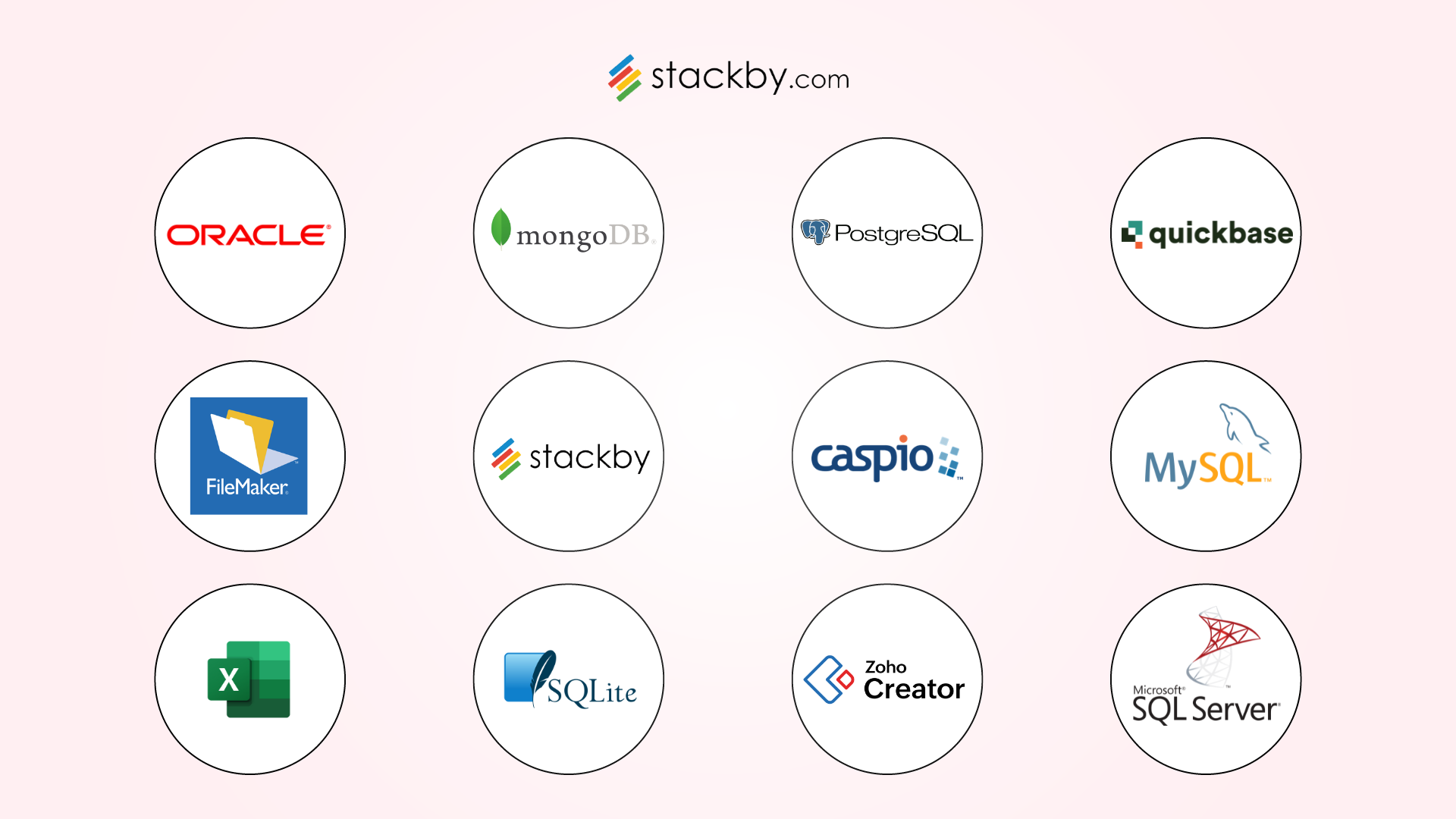
#1. Stackby - Database Manager Software for Small Business

Stackby is a versatile database software that combines the simplicity of spreadsheets with the power of databases. It's an excellent choice for SMBs looking for an easy-to-use yet powerful database solution.
Best Features:
- Versatile Views: From classic grid to Kanban, calendar, and gallery views, Stackby lets you visualize your data in ways that make sense for your workflow.
- Custom Column Types: With over 25 unique column types, including formulas, API connections, and even barcodes, you can create databases tailored to your specific needs.
- Automation Nation: Connect to 50+ popular APIs and say goodbye to manual updates. Set up time-triggered automations and watch your data update itself.
- Collaboration Central: Real-time collaboration, commenting on records, @mentions, and advanced permissions make teamwork a dream.
- Report Like a Boss: Build custom no-code dashboards with charts, pivot tables, and more to turn your data into actionable insights.
- Work Anywhere: Whether you're on web, mobile, or desktop, Stackby's got you covered. There's even a Chrome extension for the browser-lovers out there!
Limitations:
- Might require a bit of exploration to unlock its full potential
- Some advanced features are reserved for higher-tier plans
Pricing:
- Free plan available for small teams
- Paid plans start at $5/month for individuals
- Business plans from $16/user/month (billed annually)
- Custom Enterprise solutions available
#2. Caspio

Caspio is a cloud-based platform that allows businesses to create database applications without coding.
Pros:
- No-code application development
- Scalable for growing businesses
- Robust security features
- Web-based interface
Cons:
- Can be expensive for larger teams
- Limited customization for complex applications
Pricing:
- Starts at $100/month for basic features
- Custom pricing for enterprise solutions
#3. FileMaker

FileMaker, now part of Apple's Claris, is a cross-platform relational database application.
Pros:
- Easy to use for non-technical users
- Strong integration with Apple ecosystem
- Customizable interface
Cons:
- Can be expensive for small teams
- Limited scalability for very large datasets
Pricing:
- Starts at $19/user/month (billed annually)
#4. MySQL

MySQL is an open-source relational database management system, popular for web-based applications.
Pros:
- Free and open-source
- Widely used with extensive community support
- High performance and reliability
Cons:
- Requires technical knowledge to set up and maintain
- Some advanced features only available in paid versions
Pricing:
- Community Edition: Free
- Enterprise Edition: Custom pricing
#5. PostgreSQL

PostgreSQL is a powerful, open-source object-relational database system.
Pros:
- Free and open-source
- Highly extensible
- Strong data integrity and reliability
Cons:
- Steeper learning curve than some alternatives
- Can be slower for read-heavy operations
Pricing:
- Free and open-source
#6. MongoDB

MongoDB is a popular NoSQL database, ideal for businesses dealing with unstructured data.
Pros:
- Flexible schema for handling varied data types
- Horizontal scalability
- Good for real-time analytics
Cons:
- Not ideal for complex transactions
- Requires different approach than traditional relational databases
Pricing:
- Community Edition: Free
- Atlas (Cloud): Starts at $0.10/hour
7. Oracle Database

Oracle Database is a multi-model database management system, known for its robust features.
Pros:
- Highly scalable and reliable
- Comprehensive features for large enterprises
- Strong security measures
Cons:
- Can be complex to set up and maintain
- Expensive for small businesses
Pricing:
- Custom pricing, typically expensive for SMBs
#8. QuickBase

QuickBase is a low-code platform for creating business applications, including databases.
Pros:
- User-friendly interface
- Rapid application development
- Good for process automation
Cons:
- Can become expensive as you add more users
- Limited customization for complex needs
Pricing:
- Starts at $500/month for 50 users
#9. Zoho Creator

Zoho Creator is a low-code platform for building custom applications and databases.
Pros:
- Part of the comprehensive Zoho ecosystem
- User-friendly drag-and-drop interface
- Mobile app creation
Cons:
- Can be limiting for very complex applications
- Pricing can increase significantly with add-ons
Pricing:
- Starts at $25/user/month (billed annually)
#10. Microsoft SQL Server

Microsoft SQL Server is a relational database management system with versions suitable for businesses of all sizes.
Pros:
- Strong integration with Microsoft ecosystem
- Robust security features
- Good performance for large datasets
Cons:
- Can be complex for non-technical users
- Licensing can be expensive for small businesses
Pricing:
- Express Edition: Free
- Standard Edition: Starts at $899 per core
#11. SQLite

SQLite is a lightweight, serverless database engine, ideal for embedded systems and small applications.
Pros:
- Free and open-source
- Requires no setup or administration
- Excellent for small to medium-sized applications
Cons:
- Not suitable for high-volume, high-concurrency environments
- Limited features compared to full-fledged DBMS
Pricing:
- Free and open-source
#12. Spreadsheets as a Database (Excel, Google Sheets)

For very small businesses or simple data management needs, spreadsheet software can serve as a basic database solution.
Pros:
- Familiar interface for most users
- Low cost (often already available)
- Good for simple data management tasks
Cons:
- Limited scalability
- Lack of advanced database features
- Potential for data inconsistencies
Pricing:
- Microsoft Excel: Part of Microsoft 365 (starts at $6/user/month)
- Google Sheets: Free (part of Google Workspace)
Choosing the Right Database Software for Your Small Business [SMBs]
Selecting the best database software for your small business depends on several factors:
- Business Needs: Consider the type and volume of data you need to manage. Do you need a relational database or a NoSQL solution?
- Technical Expertise: Some solutions require more technical know-how than others. Assess your team's skills and the resources you have for database management.
- Scalability: Choose a solution that can grow with your business. Will it handle your data needs in 1, 5, or 10 years?
- Budget: Consider both upfront costs and long-term expenses. Some solutions have low initial costs but can become expensive as you add users or features.
- Integration: Ensure the database software can integrate with your existing tools and systems.
- Security: Especially if you're dealing with sensitive data, prioritize solutions with robust security features.
- Support and Community: Look for solutions with good customer support and active user communities for help and resources.
Relational vs NoSQL Databases for SMBs
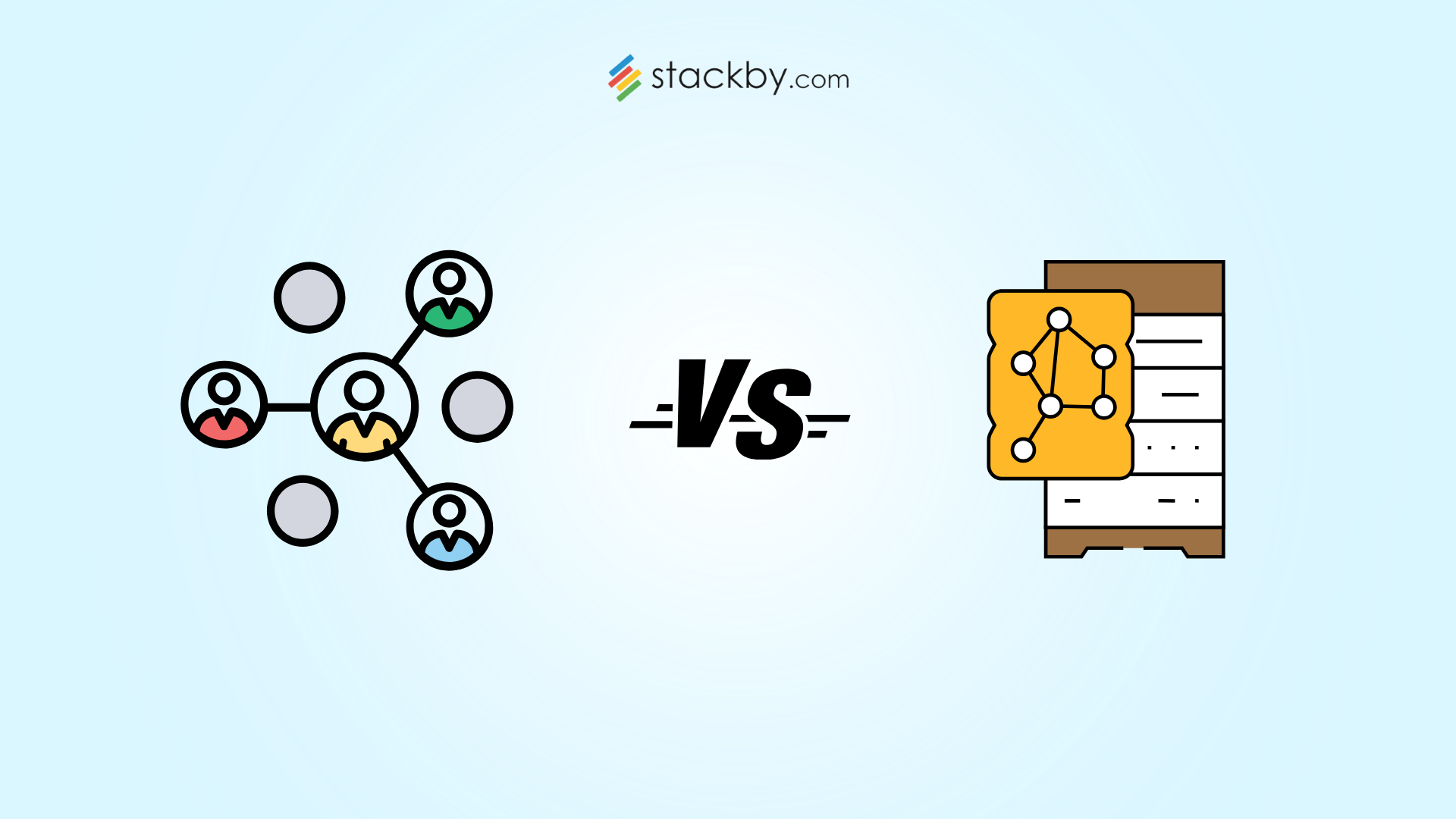
When choosing database software for your SMB, you'll often encounter two main types: relational databases and NoSQL databases. Here's a quick comparison:
Relational Databases :
(e.g., MySQL, PostgreSQL, Microsoft SQL Server)
- Best for structured data with clear relationships
- Use SQL for querying and managing data
- Ensure data integrity through ACID properties
- Ideal for applications requiring complex queries and transactions
NoSQL Databases :
(e.g., MongoDB)
- Suitable for unstructured or semi-structured data
- Offer more flexibility in data models
- Generally provide better scalability and performance for large datasets
- Ideal for real-time web applications and big data
For most SMBs, relational databases are a good starting point due to their structured nature and wide support. However, if your business deals with large volumes of varied data types or requires high scalability, a NoSQL solution might be more appropriate.
Database Software Pricing for SMBs
Pricing for database software can vary widely, from free open-source solutions to enterprise-level systems costing thousands of dollars. Here are some pricing considerations for SMBs:
- Free and Open-Source Options: Solutions like MySQL, PostgreSQL, and SQLite offer robust features at no cost, but may require technical expertise to set up and maintain.
- Subscription-Based Pricing: Many cloud-based solutions like Stackby, Caspio, and Zoho Creator offer monthly or annual subscriptions, often with tiered pricing based on features and users.
- Per-User Pricing: Some solutions charge per user, which can be cost-effective for small teams but may become expensive as your team grows.
- Resource-Based Pricing: Cloud database services sometimes charge based on resources used (storage, compute power, etc.), which can be economical for smaller datasets but may fluctuate.
- One-Time License Fee: Some traditional database software requires a one-time purchase, which can be expensive upfront but may be cost-effective in the long run.
When considering pricing, factor in not just the software cost, but also expenses related to hardware, maintenance, training, and potential customization or integration needs.
Conclusion: Empowering Your SMB with the Right Database Solution
Choosing the right database software is a crucial decision for any SMB. It can streamline your operations, improve decision-making, and set the foundation for future growth. Whether you opt for a user-friendly solution like Stackby, a powerful open-source system like PostgreSQL, or a comprehensive platform like Oracle Database, the key is to align the software's capabilities with your business needs and goals.
Remember, the "best" database software isn't necessarily the most expensive or feature-rich option, but the one that best fits your specific requirements, technical capabilities, and budget. Don't be afraid to take advantage of free trials and demos to test different solutions before making a decision.
By investing time in selecting the right database software now, you're setting your SMB up for efficient data management, improved productivity, and data-driven success in the future. So, take the plunge, explore these options, and find the database solution that will help your business thrive in the data-driven world of 2025 and beyond!

This article was originally published in March 2025 by Stackby Content Team. The most recent update was in July 2025.

![Best 14 HR Database Software for Recruitment Agency [Free+Paid] [2026]](/blog/content/images/size/w960/2024/04/stackby--hr-database-software-blog-post-5.3.jpg)
